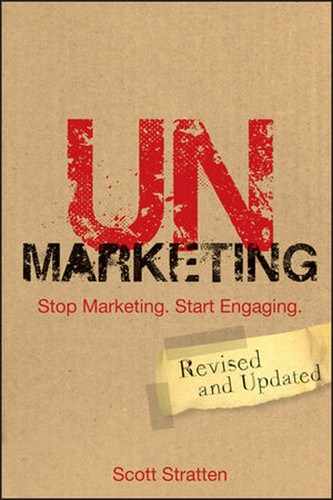3
Trust Gap
WHY DO YOU buy the things you do? Turn the mirror on yourself for a minute and think about how you make choices about your own purchases.
Trust is one of the main drivers of that hierarchy. The higher the trust, the more likely it is that someone will do business with you. This is an important point in service-based businesses that many business owners fail to recognize. One of the biggest challenges is to get someone to try a service for the first time, so companies offer ways to get you to try it “without risk.” Unfortunately, we often equate this with giving something away for free—but this does not always address the issue of trust.
Before speaking at a professional organizers conference, I researched a bunch of their web sites and noticed that many organizers were offering a “Free Consultation” of their potential customers’ home organizational needs, to get their foot in the door. By only focusing on price as a barrier to making the first purchase, they were missing something important. Of course, I do understand that price objection is a legitimate issue with many potential customers. However, there is also a tremendous trust gap. This is the amount of trust you have to earn before your potential customer will consider buying from you. The trust gap can be practically nonexistent, like buying a newspaper, but even then you have to trust that the content will be good. For many service-based businesses the trust gap is much wider.
So coming back to the professional organizer example, allowing someone into my home requires a lot of trust, which simply making it free to try does not remove. Then on top of just letting you in, you want me to let you see how horribly unorganized I am? Tack on another huge gap. I’d say right about now, the gap is as big as the Grand Canyon. Focusing on price as the only gap between us is misguided. Taking price away as an issue is like me stepping a foot closer when you’re two miles away.
Instead of focusing on the cost let’s look for ways to decrease the gap. As a potential client, I really want to get to know and trust you before I have you in my home and give you access to my mess. If, however, I regularly read great tips on your blog and I get updates via an e-mail newsletter that I signed up for, then I will begin to get to know you.
This is also a great opportunity to look for products that you can create that would require less trust and be more scalable.6 Why not reduce your customers’ hesitations and come out with an e-book about “30 Days to a Clutter-Free Home”? Get out to network and meet other people in your industry or local market and let them know about your business. Local businesspeople can become clients and can recommend you to others, which is very valuable.
Just please, for me, don’t put the “free consultation offer!” on the back of your business card. It’s like going out on a singles night and letting people know you have a “Free Make-Out Offer!”7 You are not going to this event with the goal of landing a client; you’re there to build relationships. We are going to speak often in this book about the difference between your goals and your results. Your goal always needs to be engagement; business will result.
The same goes for a business where your market is made up of solopreneurs—companies that are a one-person show. If, for example, you are a virtual assistant,8 most likely there is somewhere on your web site that talks about “freeing up your time.” As an entrepreneur running a business alone, no one knows better than I do that I am overworked and I know I need the help—that’s why I am looking on your site. But for me to give away part of my business responsibility is like dropping your kid off at the first day of school. I’m protective and territorial about it and won’t just let a person who offers me “One hour free!” to step in and represent my business.
On the other side of that, if you are a solopreneur reading this book, remember that because all points of engagement between your company and your market are potentially UnMarketing opportunities, the people you hire have to be as good as you when they represent it.9
Other areas that have a huge trust gap:
• Accounting
• Anything to do with kids
• Wellness practitioners
• Life insurance
• Counseling
• Life coaching
• Lawyers
• Many, many more10
Your entire focus when you try to attract new clients in these areas is how you can build trust to reduce that gap. When was the last time a cold call increased trust for you? I thought so.
..................Content has been hidden....................
You can't read the all page of ebook, please click here login for view all page.
